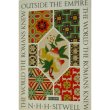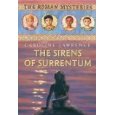

 | Cannae Publisher: Weidenfeld Military (6 Dec 2001)
| |||
Details: This is a detailed description of one of the crucial battles of the Carthaginian wars. I wish there were a lot more books like this, which focus in detail on a particular historical incident. Often, though all the facts are out there, one has to glean through dozens of books and ancient sources to find the all material relating to a particular event. This book sets out clearly almost everything that is known of one of the bloodiest afternoons in Roman history. Outclassed and outmaneuvered, the largest army ever assembled by the Roman republic went down fighting against Hannibal, losing tens of thousands of men and shaking Rome's nascent empire to its foundations. The writer went to the battlefield and walked the ground in person - the book is well researched, and an epic read. | ||||
 | Outside the Empire The World the Romans Knew Publisher: Flamingo (21 Aug 1986)
| |||
Details: This isn't an easy book to find, and if you come across a copy, grab it. It is written in a relaxed, engaging style which I find among writers who are sure enough of their stuff to have no need to hide behind jargon and complex verbiage. The usual map of the Roman empire shows Roman possessions and blank spaces beyond. This book reverses that map - it ignores the Roman world, and goes beyond its boundaries. What did the Romans know of China? Of Ireland? How far south in Africa did their knowledge extend? (hint: a lot further than you imagine.) In the process of his ancient explorations Sitwell introduces little-known and long vanished cultures and peoples. The book is a walk down seldom trodden pathways of Roman history, and all the more rewarding for it. | ||||
 | Domus Anguli Puensis A latin version of 'The house at Pooh Corner' Publisher: Methuen young books (1 Oct 2002)
| |||
Details: Once you really get into Roman history, at some point you have to bite the bullet and pick up at least a basic knowledge of Latin. If you can't get much further than 'Amo, amas, amat' there are a series of handy primers to help you. But if you have achieved basic reading competence but find Caesar charging around Gaul more than you can take, try this charming translation of The House at Pooh corner. The familiar characters and plots help to ease you into a world where Pu, Iore and Porcellus, together with Christopherus Robinus and amici teach you Latin so painlessly you are almost unaware it is happening. | ||||
 | Julia Domna: Syrian Empress Women of the Ancient World Publisher: Routledge (20 Jun 2006)
| |||
Details: I'm an enthusiast of Barbara Levick's books. She has the ability to take a complex story and present it comprehensibly without losing any of the detail. with Julia Domna we have the little-known character of one of the most powerful women in antiquity. The wife of Septimus Severus and mother of the emperor Caracalla, she travelled with her imperial relatives and had a major influence on their decisions. She was also a major force on the literature of the period, and had a life packed with colour and incident. If you like ancient biographies, this is an essential addition to your bookcase. | ||||
 | The Sirens of Surrentum: Roman Mysteries 11 The Roman Mysteries Publisher: Orion Childrens (7 September 2006)
| |||
Details: As a general rule, I tend to stay away from Roman fiction, because I do not want to inadvertently pick up and repeat any 'facts' which prove not to be so. However, Caroline Lawrence might write for younger readers, but I've yet to fault her research. Indeed, she has often been physically to the scene where she sets her young protagonists. (The Villa Limona, where this book is set, is just such a place.) Usually I unhesitatingly recommend Caroline Lawrence books to parents with children getting interested in Roman history, but I've picked this book in particular as it deals with some more adult themes. Parents might like to read it before being certain it is right for their kids, and I won't be surprised if, even after they have decided that it is right, they go on anyway to read the book from cover to cover. I did, and I don't even have children. | ||||
 | The Archaeology of Athens Publisher: Yale University Press (6 Feb 2004)
| |||
Details: There were a huge number of books I consulted when writing Athens on five drachmas a day, but the book I kept coming back to was this work by John Camp. The title does not do the book justice. As well as archeology, this book has extensive quotations from the ancient sources and a wonderful set of illustrations and reconstructions. There are individual site surveys, and descriptions of ancient Athenian life. The entire work is clearly written by someone who knows his subject backwards and has the ability to communicate his enthusiasm to readers. And if you are visiting Athens, you need to make space for this book in your suitcase. | ||||
 | The Oxford Classical Dictionary Publisher: Oxford University Press (27 Mar 2003)
| |||
Details: When I went to order this book, I blanched at the expense. The OCD costs over £10 a kilogram, and it is not a book you can drop on your foot without causing serious injury. However, it is at hand whenever I write - an instant and authoritative reference to people, places and myths of the ancient world, accompanied by a short bibliography of which books to get if the subject needs further in-depth investigation. Like Smith's Dictionary of Greek and Roman Biography and Mythology, this is one of the most comprehensive reference books on the classical world you are going to find, and unlike Smith, this book is up-to-date with the latest scholarship, with many articles written by the leading experts in their field. If you are considering writing, researching, or teaching classics and ancient history, it is well worth the investment. | ||||